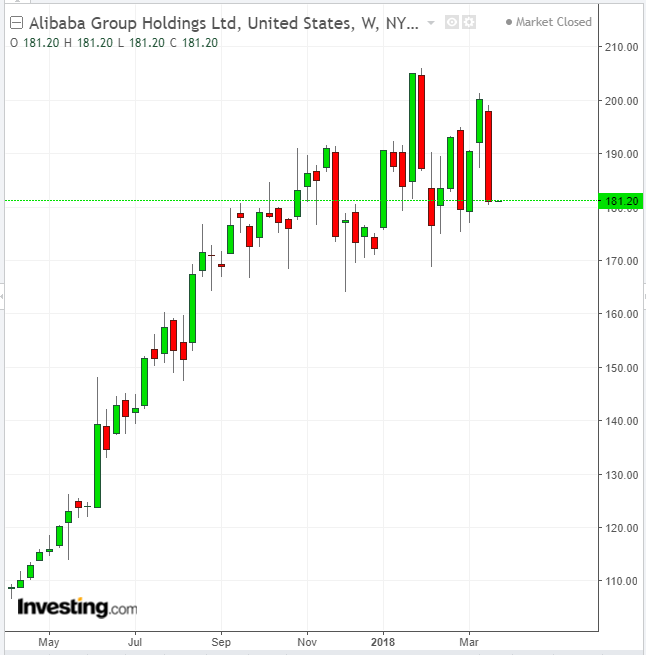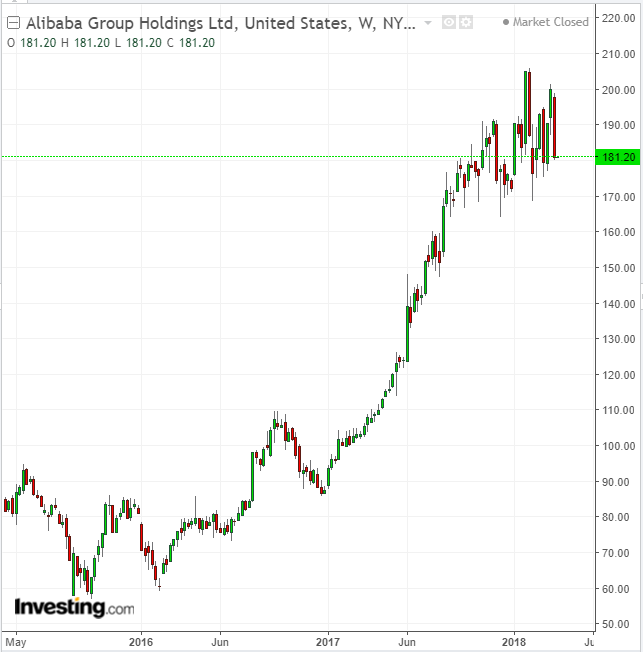Chinese e-commerce giant Alibaba Group Holding Ltd (NYSE:BABA) has been a great trade for investors wanting exposure to the world’s second most powerful economy.
During the past year, Alibaba shares have massively outperformed the technology sector, surging 68% compared to the Technology Select Sector SPDR ETF (NYSE:XLK) which only saw 22% gains. Note that this ETF, though widely used as a representative vehicle for the sector, has no weighting in Alibaba shares.

Investors have rallied behind Alibaba ever since its 2014 listing in the U.S. Indeed, those who bought and held the stock were handsomely rewarded. The company saw explosive growth, a result of the unprecedented technology boom in China alongside the country's growing middle class.

As well, Alibaba has posted double-digit revenue growth every year since 2013, including a 48% leap this past year.
However, there are signs that its remarkable rally could be running out of the steam as competition heats up in the Chinese marketplace and investors evaluate whether Alibaba’s global push has brought additional value to the company. BABA shares have tumbled more than 12% since hitting a record high of 205.69 during intraday trade in January.
Has the stock peaked or is this merely a blip before it resumes its upward trajectory? My view is it's a short-term pullback and a good buying opportunity for long-term investors.
Domestic Growth
Even with Alibaba's significant inroads, the Chinese e-commerce market still has huge growth potential. China's e-tail market is just 15% of the total trade environment. Alibaba’s spending priorities suggest that founder Jack Ma hasn't yet fully fulfilled his domestic ambitions.
The company has spent at least $13 billion since 2015 on acquisitions of brick-and-mortar companies in an array of industries from logistics and automobiles to retail, according to Bloomberg data. The major part of Alibaba’s domestic growth strategy is to help physical retailers digitize and in the process bring them onto Alibaba’s e-commerce ecosystem. As part of this the company is also expanding the reach of its online payment system, Alipay.
If you take into account the the firm’s growing cloud service business and its online payment arm, Alibaba has a significant chunk of every segment of China’s e-commerce marketplace. I highly doubt this situation will change anytime soon either, despite the growing competition from local players such as Tencent (OTC:TCEHY), and Jd.Com (NASDAQ:JD).
The next big catalyst for Alibaba: a mainland listing on an exchange in its home turf. The stock rallied on March 15 when The Wall Street Journal first reported that a Chinese IPO is a possibility this year if China's regulations are loosened to allow foreign companies to list.
Global Expansion
The second critical driver for Alibaba’s future growth is global expansion. The company is targeting the addition of two billion customers in order to augment its current 500 million in China. Southeast Asia, the region that shares cultural characteristics with China, is a big part of this push.
During the past week, Alibaba announced it was investing another $2 billion in the Lazada Group SA, raising its total stake in the Singapore-based, regional e-commerce giant to $4 billion. Lazada, which launched in 2012, operates in Indonesia, Malaysia, the Philippines, Singapore, Thailand and Vietnam.
With 640 million consumers, a growing middle class and deepening smartphone penetration, Southeast Asia is the next battleground for technology giants. Consultancy Frost & Sullivan forecasts total gross merchandise value of e-commerce in the region to rise to $65.5 billion in 2021 from $20.5 billion last year.
Investor Takeaway
Despite the recent weakness in BABA stock, I remain bullish on this company. It provides unique exposure to the world’s second largest economy as well as Asia’s other emerging markets.
The majority of analysts on Wall Street have a buy rating on Alibaba with an average $229 price target, implying about 23% upside potential from Friday's close. Irrespective of short-term targets, I think Alibaba is the sort of stock that buy-and-hold investors could consider on every dip.
